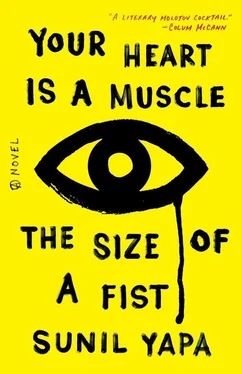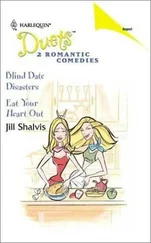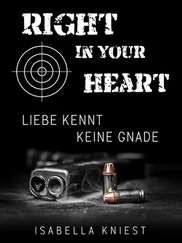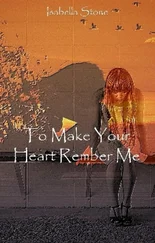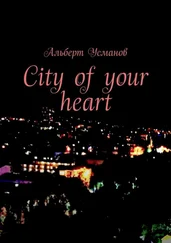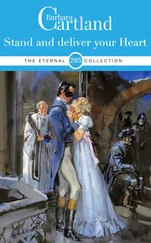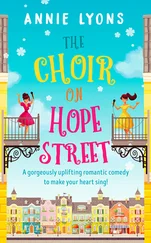And now here he came. His son.
His physical appearance so markedly changed from when Bishop had last seen him. A boy become a man. But what he encountered there in the darkness of the clamor, what he saw, was not the sun-kissed world traveler he had perhaps imagined his son would look like. No, what he saw was a skinny man destroyed by the day, bedraggled, with eyes nearly shut and two loose braids and a pair of Air Jordans on his feet which had always seemed out of proportion, too big for his body at sixteen, but which Bishop realized weren’t too big for him at all anymore.
The very same shoes. The very same son. He had grown into his feet. Into his skin. The son who had lifted his head from a shoe box at the age of fifteen and said, “Dad, do you think the world is a good place?” The son who, one year later, had disappeared into the world and Bishop wishing every day since for him to come back. The son who was now nineteen and it made him want to weep. When had his son gotten so tall?
Bishop heard the sound of the shot before he realized what it was.
Didn’t know what he was seeing as he watched Victor crumple in the street like a paper kite.
And then he realized. He took two steps across the running board and grabbed Park by the vest. Another explosion rocked the intersection. Bishop swung him around just as the man was about to fire his weapon again. Swung him around until they were face to shocked, surprised face. You have to take a side, and in that moment it could never have been any more clear. The police fired on Victor, fired on his son, and Bishop chose his side. He knew exactly to whom he belonged. Whose body. Whose hands. Whose breath and beating heart.
Looking into the man’s eyes. Seeing the fear there. Asking himself, What about an unarmed nineteen-year-old scares an armed police officer?
King saw Victor twenty feet from the PeaceKeeper when the shot took him in the chest. The daydreamy feeling was gone, shattered. She felt a certain clarity in the deepening dusk as she climbed the hill to Sixth and Pine. The smell of burning diesel drifted down the street. It was a sort of antiseptic, this familiar smell of combustible fuel and trash. It took her back to Central America, to Chiapas, to Mexico — diesel fumes and the sweet pungent odor of fruit and sweat. Bus-seat stuffing and a leak in the roof and a sweat-soaked shirt hung on a line. Big-leafed trees in the backyard. The way the first drops of rain raised craters in the roadside dust; the veneer of oil collected from passing cars, taxis, Toyota trucks, the rumbling multi-ton buses with their wheels the height of a child, their swinging crosses to guard against the low mean spirits of the night.
She saw the rubber bullet crush Victor in the chest. His arms snapped back and he went down, legs tangled, his down jacket leaking feathers in a great burst of white.
She saw Victor go down and she saw, tracing the rubber bullet’s path backward to the PeaceKeeper, the asshole cop from this morning who made the shot.
And then the cops descended because you do not try to approach the PeaceKeeper, you do not threaten a police officer by walking toward him, and she saw Victor, curled and cramped and surrounded by armed angry cops. His face looking up among the dark anonymity of the assembled riot gear.
Four of the cops stood back. As if joined by one brain, one beating heart, they stepped forward together and their batons descended.
King knew she would remember, drifting toward sleep some day far removed, the solid thump the wood made falling upon him. It was the sound of the true heartbeat of the world, and once it had been heard, there was no way to stop hearing it. Thump-thump. Thump-thump. And what was it in that long and prolonged instant — what was it that told her this pain would go on forever? What was happening there was no erasing. There would be no apologies, no forgetting, no reconciliations. Just the opening to the pain that is your friend dead or shot or starved or beaten. Disappeared into the place where the disappeared die. She saw six cops standing over him and there was something in the way their fists rose and fell that made her heart want to stop. Like a clock that had run out of time. King could see it in every crunch and shuddering shock. Something in the way they stood over the boy working their sticks. Heard it in every hoarse burst of air. Something in the way they raised their batons, feet spread for balance as if gathering strength from hip and leg. The way they paused before swinging as if measuring the blows.
And King knew exactly what John Henry would say. John Henry would say look at how they are forced to hit him. We have won. Look at what they are forced to do to save themselves.
And tell me is what they protect worth a man’s life? Free trade? This is something we all want and need? Why must they beat a man in the street if the answer is yes?
Victor was bleeding now and King heard the wet slap of the clubs on flesh. She thought nonviolence. She thought I will witness this. Victor scared like an animal on the pavement, his hands covering his head, and she said to herself, I will witness this. I will witness this and I will remember this and wasn’t this exactly what John Henry said would happen?
Yes, it was. But it wasn’t supposed to be Victor. And who, John Henry might have said, had guided him to this moment? Tell me, King, who put Victor in lockdown?
They rolled him onto his back. Two cops bent and pried his arms from his face. You could glimpse some clue of it in their arms and shoulders. The force behind their blows, the desperation of their fury, the angry and frightened look in their eyes — it was the ancient terror of a police whose mission it was to control people who were unafraid of their violence.
If you are not afraid of dying.
She saw a kid dancing with a can of lighter fluid ablaze and Jimi Hendrix playing “The Star-Spangled Banner” on someone’s battered boom box, and there was a time when she thought she knew the feeling that had brought them here, these people who were now in the street joyfully burning the city. She had thought she understood it on some level, what brought them out, what thrill there was. No, not thrill.
Just say it.
If you are not afraid of dying, then what freedom you fucking feel. What freedom there is to burn and wreck. To stand in the middle of a city street, a street with the lights to go and the lights to stop and the taxis passing and the buses passing and the limos passing, and the lights that told you when to go and when you had to stand there on the corner looking helpless and lost; the cops and the cameras and the people with their lives lived behind walls that you see in the eyes and what a stupendous devastating freedom to stand in the middle of a street like this and torch the motherfucker. What a cold excitement in the chest to break a barricade and burn a dumpster. To put a crowbar, yes, through a bank window.
That intoxication of ignition, the sweet smell of fuel, the way the paper rose in the heated air light as tissue, burnt and torn messages rising to a god you did not believe in — yes, there had been a time when she thought she understood this.
The world doesn’t give you what you want?
Burn it down.
Now, watching their bodies taking the blows, she saw it for what it was.
Because where have you arrived when you take your piece of pavement, your glass bottle, your stone, to go to war with a modern military? When all you have left is your body, or the body of your son, and that is what you throw in the street. That is your final roadblock to occupation.
Jesus Christ, look at them. Attempting to take a city with nothing more than their bodies and whatever currents might run inside.
No, revolution was not glamorous. Revolution was a sacrifice. A desperation. The last insane leap to some future where you might have the room to breathe. Except there was nothing there when you landed but a wall running east to west.
Читать дальше
